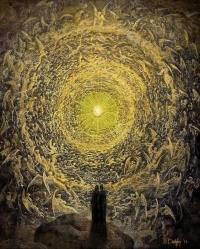Demiurge
Demiurge (from the Greek δημιουργός, dēmiurgós) literally means "workman" or "craftman" (from dēmi = people and urgós = work). This term was originally used in the Platonic, Neopythagorean, and Neoplatonic schools of philosophy to designate a subordinate deity that "fashions" the cosmos following the eternal ideas, using preexisting primordial material chaos. Christian Gnostics also used this term for the lower god that is the creator of the material world. Therefore, the concept of the Demiurge is not the same as the traditional idea of an ultimate Creator in the monotheistic sense.
In Theosophical teachings, the Demiurge is generally identified with "the third manifested Logos."[1] H. P. Blavatsky wrote in The Secret Doctrine that this Demiurge is not a single being but, rather, the collectivity of all the creative powers of the cosmos, which are guided by the abstract principle of Cosmic Ideation.
In Esoteric philosophy the Demiurge or Logos, regarded as the CREATOR, is simply an abstract term, an idea, like “army.” As the latter is the all-embracing term for a body of active forces or working units—soldiers—so is the Demiurge the qualitative compound of a multitude of Creators or Builders.[2]
[The Secret Doctrine] admits a Logos or a collective “Creator” of the Universe; a Demi-urgos—in the sense implied when one speaks of an “Architect” as the “Creator” of an edifice, whereas that Architect has never touched one stone of it, but, while furnishing the plan, left all the manual labour to the masons; in our case the plan was furnished by the Ideation of the Universe, and the constructive labour was left to the Hosts of intelligent Powers and Forces. But that Demiurgos is no personal deity,—i.e., an imperfect extra-cosmic god,—but only the aggregate of the Dhyan-Chohans and the other forces.[3]
Although this creative force "directs and guides" the cosmic processes, the collective Demiurge is not regarded as being perfect. As everything else in the manifested cosmos, it is following a course of evolution:
As that process is not always perfect; and since, however many proofs it may exhibit of a guiding intelligence behind the veil, it still shows gaps and flaws, and even results very often in evident failures—therefore, neither the collective Host (Demiurgos), nor any of the working powers individually, are proper subjects for divine honours or worship. All are entitled to the grateful reverence of Humanity, however, and man ought to be ever striving to help the divine evolution of Ideas, by becoming to the best of his ability a co-worker with nature in the cyclic task.[4]
Because the Demiurge represents all the forces of nature, it includes both the creative and destructive ones:
The Demiurge, regarding [it] as the creator of our planet and everything pertaining to it . . . [is] good and bad at the same time, the origin of good and the origin of evil. This “Creator” is neither good nor bad per se, but its differentiated aspects in nature make it assume one or the other character.[5]
Notes
- ↑ Helena Petrovna Blavatsky, The Theosophical Glossary (Krotona, CA: Theosophical Publishing House, 1973), 97.
- ↑ Helena Petrovna Blavatsky, The Secret Doctrine vol. I, (Wheaton, IL: Theosophical Publishing House, 1993), 380, fn.
- ↑ Helena Petrovna Blavatsky, The Secret Doctrine vol. I, (Wheaton, IL: Theosophical Publishing House, 1993), 279-280.
- ↑ Helena Petrovna Blavatsky, The Secret Doctrine vol. I, (Wheaton, IL: Theosophical Publishing House, 1993), 280.
- ↑ Helena Petrovna Blavatsky, The Secret Doctrine vol. II, (Wheaton, IL: Theosophical Publishing House, 1993), 25.
